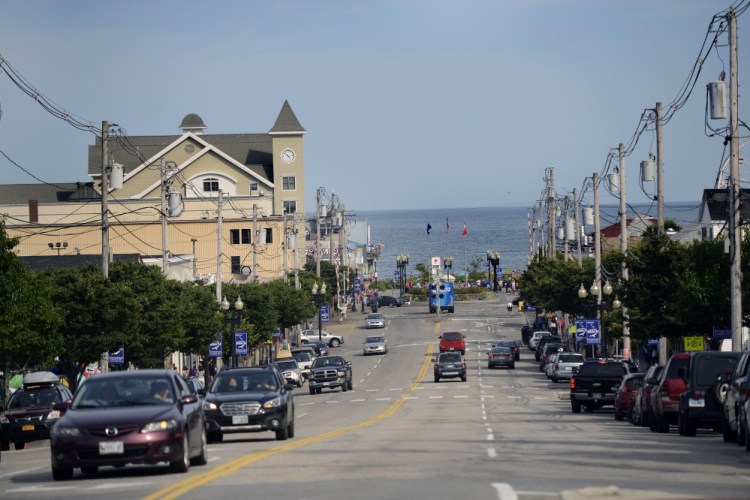Old Orchard Beach may become the next Maine community to limit where sex offenders can live, and the neighborhoods along the town’s popular 7-mile-long sandy beach are among those that would be off-limits.
Nearby Biddeford and South Portland have implemented similar restrictions, prompting Old Orchard Beach police to draft an ordinance. Police Chief Dana Kelley said the restrictions are needed to “safeguard places where children congregate.” In addition to the area next to the beach, neighborhoods surrounding parks and schools also would be restricted.
“In order to enforce the 750-foot (restriction allowed under) state law, communities have to create their own ordinance that requires that,” he said. “It’s another tool that we can use if we have to.”
Biddeford’s recently adopted rules also apply to areas next to that city’s much smaller public beaches.
The Old Orchard Beach Town Council will hold a public hearing on the proposed ordinance at 7 p.m. Tuesday. The board could vote on it as soon as Aug. 4.
Local ordinances are allowed under a 2009 Maine law that permits municipalities to prohibit certain sex offenders from living with 750 feet of a school, park or other public facility where children are the primary users. The ordinance can apply only to sex offenders who have been convicted of crimes against children younger than 14.
The residential restrictions, and similar laws in some other Maine communities and around the country, have seen broad public support from those who say they are a measure to protect children.
Opponents, however, say the restrictions are not based on evidence and could possibly even make communities less safe by driving sex offenders underground or into homelessness.
There are roughly 3,100 registered sex offenders living in Maine, a number that fluctuates daily as people come off or are added to the list, or move in or out of the state.
In 2014, the South Portland City Council unanimously passed an ordinance restricting where sex offenders can live. Bangor passed its ordinance in 2013. The city of Portland discussed a local ordinance in 2010 but never enacted one.
In May, the Biddeford City Council unanimously approved an emergency measure to make it illegal for certain registered sex offenders to live close to playgrounds, schools and public property that mainly serves children. The restrictions were enacted in the wake of an ongoing controversy over decades-old sexual abuse allegations, some of which are now under investigation.
Biddeford’s restrictions prevent sex offenders convicted of crimes against children from living in much of the downtown core, where many affordable apartments are located, as well as swaths of property around Rotary Park, city schools and Clifford Park.
Biddeford Police Chief Roger Beaupre said there have been no issues in that city since its ordinance was implemented in May.
According to the Maine Sex Offender Registry, 19 sex offenders live in Old Orchard Beach, a town of roughly 8,600. Kelley said he believes there are actually 15 sex offenders in the town because several recently moved from the area. The ordinance does not apply to visitors.
If the ordinance is approved, the planning department will create a map showing the prohibited areas. The restrictions do not apply to convicted sex offenders who already live in homes within the prohibited areas when the ordinance takes effect.
Saco Police Chief Brad Paul said he is keeping a close eye on the effect that restrictions in surrounding communities could have in his city.
“If they begin to result in an influx of sex offenders registering in the city of Saco, then quite frankly I would put it before the council as a defensive measure,” he said.
Paul said residency restrictions have been discussed within the department, but he has never broached the subject with the City Council. There have been no issues that would drive police to seek the restrictions, and Paul said he recognizes why there could be opposition.
“We realize that there is concern about pushing them out of one neighborhood and concentrating them in another,” he said.
Nationally, strict residency restrictions have faced constitutionality questions, with civil rights groups arguing that restrictions containing an overly broad ban on where sex offenders can live effectively create a communitywide barrier.
In March, a court ruling in California forced the state to alter its 2006 law that had a blanket ban on sex offenders living near parks or schools, rendering many of the registered sex offenders in the state homeless. California now restricts the residencies of sex offenders whose crimes involved children.
Send questions/comments to the editors.




Success. Please wait for the page to reload. If the page does not reload within 5 seconds, please refresh the page.
Enter your email and password to access comments.
Hi, to comment on stories you must . This profile is in addition to your subscription and website login.
Already have a commenting profile? .
Invalid username/password.
Please check your email to confirm and complete your registration.
Only subscribers are eligible to post comments. Please subscribe or login first for digital access. Here’s why.
Use the form below to reset your password. When you've submitted your account email, we will send an email with a reset code.